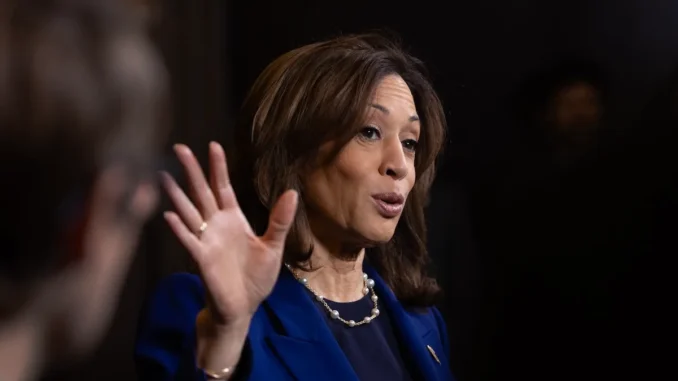
Kamala Harris Shuts Down Trump’s Healthcare Proposal with a Direct Response on Women’s Health
In a recent exchange that highlighted the ongoing debate over healthcare policy in the United States, Vice President Kamala Harris provided a pointed rebuttal to former President Donald Trump’s latest healthcare proposal. Trump recently discussed his vision for healthcare reform, touching on various points but without offering substantial details. The proposed plan faced swift criticism, particularly regarding its implications for women’s health. When questioned about Trump’s proposal, Harris quickly shut it down with a direct, simple response: “He’s gonna work on… women’s health?”
Harris’ response reflects a broader concern about the impact of Trump’s policy history on women’s health, particularly as discussions around reproductive rights and healthcare accessibility continue to intensify. Her comment speaks to a stark contrast between the two leaders’ stances on healthcare, with Harris’s reaction resonating among those who advocate for women’s health issues and feel wary of policies that could undermine those needs.
Trump’s Healthcare Proposal: What We Know So Far
Trump’s healthcare proposal comes amid growing discussions about how to improve the American healthcare system, a topic that has long been central to political debate. Although Trump introduced sweeping changes during his presidency, including attempts to repeal and replace the Affordable Care Act (ACA), his administration never succeeded in passing a comprehensive healthcare reform plan. Now, as he seeks to regain political traction, Trump has returned to the issue, proposing a new approach to healthcare, although specifics remain sparse.
The proposal, as discussed by Trump in recent public appearances, alludes to plans that could overhaul aspects of the current system, including provisions related to women’s health. However, the lack of clear details has left many speculating about how the plan might affect services essential to women, such as reproductive healthcare, preventive services, and mental health support. Trump’s track record on these issues raises concerns for many advocates who recall his previous efforts to restrict access to reproductive health services, including defunding organizations like Planned Parenthood and attempting to eliminate federal coverage for contraceptives under the ACA.
Harris’ Direct Response Highlights Concerns Over Women’s Health
Kamala Harris’ reaction to Trump’s comments reveals a critical stance on his healthcare agenda, particularly where it pertains to women’s health. Her response, though brief, was layered with implications that resonate with a significant portion of the American public, especially women who are wary of potential threats to their healthcare rights. Harris, an advocate for women’s rights throughout her political career, has consistently pushed for policies that protect and expand access to women’s healthcare, including reproductive rights.
In her rebuttal, Harris drew attention to what she, and many others, see as Trump’s inadequate approach to women’s health, focusing on the lack of specificity and the potential rollback of key protections. For Harris, healthcare policy is intrinsically linked to human rights, and she has argued that any reform should prioritize accessible and comprehensive services for all Americans, especially women who often face unique health challenges and barriers to care.
The Historical Context: Trump’s Impact on Women’s Health
One of the core concerns surrounding Trump’s healthcare proposal is rooted in his administration’s previous policies, many of which disproportionately affected women’s access to healthcare. During his time in office, Trump enacted measures that restricted federal funding for women’s health services, particularly in the area of reproductive health. Under his administration, organizations like Planned Parenthood faced funding cuts, directly impacting access to affordable contraceptives, cancer screenings, and general healthcare for millions of women, especially those in underserved communities.
Trump’s stance on reproductive rights was another significant factor in Harris’ response. Throughout his presidency, Trump aligned himself with conservative initiatives to limit abortion rights, supporting legislation that restricted access and funding for abortion services. His administration’s attempts to overturn Roe v. Wade, eventually realized by a conservative majority in the Supreme Court, marked a significant shift in reproductive healthcare policy, placing further strain on women’s healthcare options.
Given this history, Harris’ reaction to Trump’s new proposal reflects skepticism, as many fear that another term under his leadership could mean further restrictions on women’s health services. For Harris and many of her supporters, the idea of Trump “working on women’s health” seems contradictory, given his administration’s policies that undermined access to crucial services.
Harris’ Own Vision for Women’s Healthcare
As Vice President, Kamala Harris has been vocal about the need for a healthcare system that is inclusive and prioritizes preventive care, mental health services, and reproductive rights. Harris has advocated for protecting and expanding the ACA, emphasizing the importance of affordable healthcare and access to services like contraceptives, maternity care, and mental health resources. Her vision includes closing healthcare gaps for women, particularly those in marginalized communities, who often face systemic barriers to accessing care.
Harris has also focused on the importance of supporting policies that address maternal health disparities, an area where the United States ranks poorly compared to other developed nations. Black women, in particular, face higher maternal mortality rates, and Harris has been a proponent of expanding maternal health services and advocating for policies to improve health outcomes for mothers and infants. Her advocacy for reproductive rights and her opposition to restrictive abortion laws have further solidified her stance as a defender of women’s healthcare.
The Broader Healthcare Debate
The exchange between Harris and Trump underscores the broader debate about the future of healthcare in the United States. With healthcare costs rising and access to quality care varying widely based on factors like geography and income, the issue remains a top priority for voters. Women’s health, in particular, has become a focal point, as recent legislative changes have altered the landscape of reproductive rights and access to care.
As Harris and Trump continue to shape their healthcare messages, the public is paying close attention to their approaches. For Harris, healthcare reform means prioritizing preventive services, reproductive rights, and equitable access. For Trump, the emphasis has often been on cost-cutting and deregulation, which some argue risks reducing the quality and availability of healthcare for vulnerable populations, including women.
The Political Implications of Harris’ Response
Harris’ pointed response to Trump’s healthcare proposal was not just a dismissal; it was a strategic political move that highlights the stark contrast between the two leaders’ visions for healthcare. By calling attention to Trump’s record, Harris tapped into a sentiment shared by many women who are concerned about the future of their healthcare rights under a conservative administration. Her comment resonated with advocates for women’s health who have long argued that Trump’s policies were detrimental to accessible, quality healthcare for women.
This exchange also illustrates the impact of healthcare policy on electoral dynamics. Women, particularly young women and women of color, have become a significant voting bloc, with healthcare being one of their top issues. By positioning herself as a defender of women’s health, Harris is likely to strengthen her support among these voters, who view accessible healthcare as a fundamental right.
Looking Ahead: The Future of Women’s Health in America
The question of who will shape the future of women’s health in America remains critical as election cycles continue. Harris’ rebuttal to Trump’s healthcare proposal brings this issue to the forefront, emphasizing that women’s healthcare rights and access to necessary services are on the line.
For Harris and her supporters, the stakes couldn’t be higher. As the political landscape shifts and leaders propose varying visions for healthcare reform, women’s health will remain a defining issue. Whether the country moves toward expanded rights and access or regresses into more restrictive policies is yet to be seen, but one thing is clear: Harris is prepared to continue defending women’s health as a top priority, countering proposals that she believes fail to support women in a meaningful way.



Be the first to comment